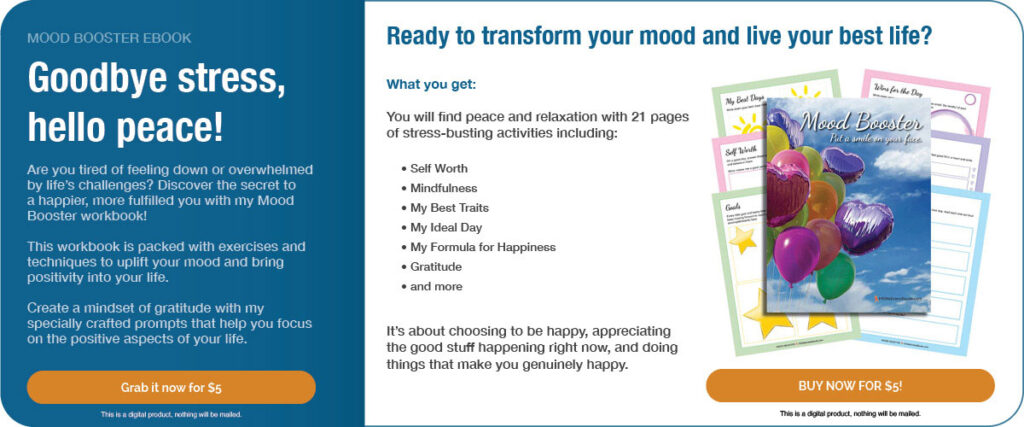Last Updated on November 13, 2023 by Cathy

As the days get shorter and the weather gets colder you may find yourself feeling a little depressed. This is what they call the “winter blues.” It is a type of depression that occurs at certain times of the year. It affects people during the fall and winter months with less natural sunlight.
It’s more common in northern states where there is less daylight compared to southern states. I used to work at a job where I never saw the sun during December. The sun rose just after I got to work and it set just as I was leaving. Plus, the building didn’t have windows so in my mind it felt as if it was dark all day. Even on days I was home it was usually cloudy so I still didn’t see the sun.
Changing the clocks back one hour for Daylight Saving Time (DST) can also cause the winter blues. When the clocks “fall back,” there is less natural daylight in the evenings. It also disrupts the body’s internal clock and circadian rhythms, potentially triggering depression.
Fortunately, having the winter blues usually clears up on its own. However, Seasonal Affective Disorder (SAD) is a more complicated diagnosis. Winter blues and SAD are similar, but they exhibit distinct conditions.
Symptoms from the Winter Blues:
- A milder and more common condition.
- Generally doesn’t meet the criteria for clinical depression.
- It might be due to the cold, dark, less active winter season, but it doesn’t greatly affect daily life.
- Often referred to as “winter blues” or “winter doldrums.”
- Typically, it involves feeling a bit down or having low energy during the winter months.
Its symptoms are similar to those of depression. It may include low energy, changes in sleep and appetite, and a feeling of sadness or hopelessness.
Symptoms from the Seasonal Affective Disorder (SAD):
- A more severe and specific type of depression.
- Can interfere with a person’s daily life.
- It usually occurs in the fall and winter and improves in the spring or summer.
- Often requires treatment, such as light therapy, psychotherapy, or medication.
- Symptoms are similar to major depression. It can include sadness, fatigue, changes in sleep and appetite, and difficulty concentrating.
Researchers believe it’s due to the reduced exposure to sunlight. It can disrupt the body’s internal clock and affect mood-regulating neurotransmitters. Light therapy, psychotherapy, and medication are common treatments for SAD.
Overall, winter blues is a milder condition while SAD is more severe. If you are experiencing symptoms of SAD, it’s important to seek professional help.
Multiple Sclerosis and The Winter Blues
People with multiple sclerosis (MS) may be more vulnerable to the winter blues. When the weather is nasty outside it’s hard on everyone but having MS it becomes more challenging. And, there’s a greater risk of falling and getting seriously hurt.
Winter can be more challenging for people with MS due to several factors including:
- Feeling Isolated. Spending quality time with loved ones and organizing social gatherings is a great strategy for chasing away the winter blues. Today is easy to join groups through social media or make video calls using Alexa Show, Facetime, Skype, WhatsApp, or Zoom.
- Limited Sunlight. Reduced daylight and sunlight exposure can impact mood and overall well-being.
- Reduced Mobility. Winter weather can make it more difficult for people with MS to move around safely. Especially in snowy or icy conditions.
- Seasonal Viral Infections. The cold and flu season during winter may increase the risk of infections. This can lead to temporary symptoms or relapses in some people with MS. Drug modifying therapies (DMTs) suppress the immune system. This could make a person more susceptible to infections, including colds and the flu. It’s a good idea to take vitamin C.
- Temperature Sensitivity. Many people with MS are sensitive to temperature changes, particularly extreme cold. The cold can exacerbate symptoms such as muscle stiffness and spasticity.
Having MS you already have a risk for severe fatigue, mobility issues, and depression. Having less sun exposure can make these worse. It may be better to stay indoors during the winter months to avoid icy conditions. However, it’s important to stick with an exercise routine to stay strong and mobile.
Try exercises such as these to keep your MS symptoms from getting worse:
- Breathing exercises
- Online exercise gyms for MS, my favorite is the OptimalBody Personal Fitness
- Seated exercises
- Stretching exercises
- Tai Chi
- Take a virtual class
- Yoga
Joining a fitness class or engaging in regular exercise is a good way to chase away the winter blues and stay active. Listen to your body and slowly boost your workout intensity and duration. Plus, stay hydrated and maintain a comfortable temperature while exercising. It’s important not to get overheated.
Chasing Away the Winter Blues

Image by KamranAydinov on Freepik
As the cold winter months set in, it’s easy to start feeling a bit down. But, when possible get as much natural sunlight as you can, it is a mood booster. Combat the winter blues by staying active, eating healthy, exercising, and social connections. Studies show that a healthy diet helps improve people’s mood – that includes fruit!
Don’t be afraid to eat fruit. The fiber in fruit does NOT spike your blood sugar. My son is a type 1 diabetic and he does not reach for fruit when his blood sugar is low. Instead, he drinks fruit juice because it does not have fiber. Fruit juice spikes your blood sugar, not whole fruit.
Enjoy autumn and winter fruits such as:
- Apples
- Clementines
- Cranberries
- Dates
- Grapefruit
- Kiwis
- Mandarin oranges
- Papaya
- Passion fruit
- Pears
- Pineapple
- Pomegranates
- Tangerines
Find Something That Will Interest You

Image by Freepik
Find something to do indoors you’ll look forward to. Staying busy and engaging in activities you enjoy can help prevent the winter blues by providing a sense of purpose, reducing boredom, and promoting positive mental well-being. Do things that you already enjoy or find something new.
Keeping a busy schedule during the winter months not only provides a distraction from the gloomy weather but also gives you a sense of accomplishment and social connection. Whether it’s pursuing hobbies, exercising, or spending quality time with friends and family, staying engaged can elevate your mood and energy levels.
Don’t lay around in bed all day – get up! Setting realistic goals for yourself and breaking them down into manageable tasks can create a sense of structure and motivation, contributing to a more positive mindset throughout the winter season. For example set certain times to eat, exercise, read, and other hobbies. – Set reminders or an alarm on Alexa, your smartphone, or use an app.
Besides Christmas, I always look forward to a certain day in December. That is… December 21st, because the days are starting to get longer – yayyy!

Enjoy indoor winter hobbies and activities, such as:
- Biohacking (ways to improve your health) such as infrared light, grounding mats, and vibration plate
- Cooking or baking
- Crafting and DIY projects
- Discovering your genealogy
- Indoor gardening or tending to houseplants
- Learning a new skill or taking online courses
- Listening to music
- Meditation
- Models, my son turned me onto Legos, here’s one I have Wildflower Bouquet
- Organizing such as your house, paperwork, and photos
- Painting or drawing, try a paint-by-number set
- Playing board games or card games
- Reading books or magazines – check your library for free online books
- Watching movies or TV shows, you can watch Prime videos for free if you’re an Amazon Prime member if not click on this link to sign up and start a free trial
- Writing, journaling, or creative writing
Beat the Winter Blues
Chasing away the winter blues can be as simple as enjoying a warm cup of herbal tea. Exploring new hobbies and passions can be a fun and creative way of chasing away the winter blues. These activities can be both enjoyable and productive ways to pass the time indoors. Embracing self-care routines, from mindfulness meditation to warm bubble baths, can make a big difference in chasing away the winter blues.
It’s all about finding that balance and taking care of yourself, so you can get through winter. ❄️
Quick Links To Information In This Post:

Want to remember this health tip? Pin it to your Pinterest board!
 Image by senivpetro on Freepik
Image by senivpetro on Freepik
Resources:
https://newsinhealth.nih.gov/2013/01/beat-winter-blues
Chasing Away the Winter Blues







